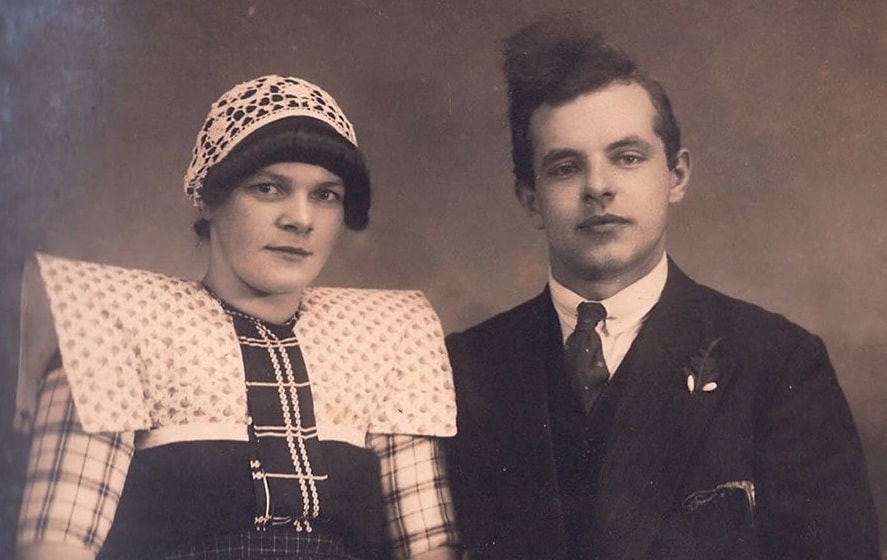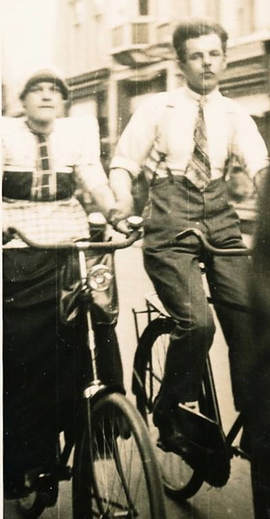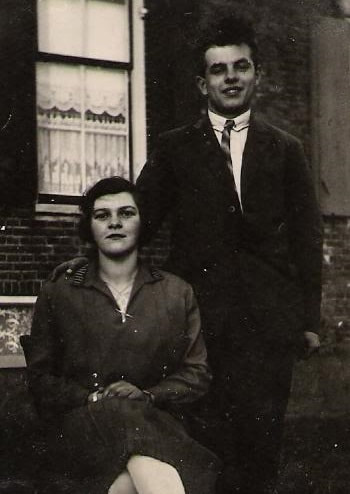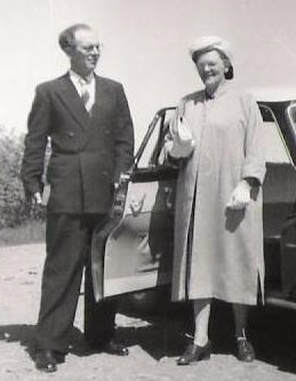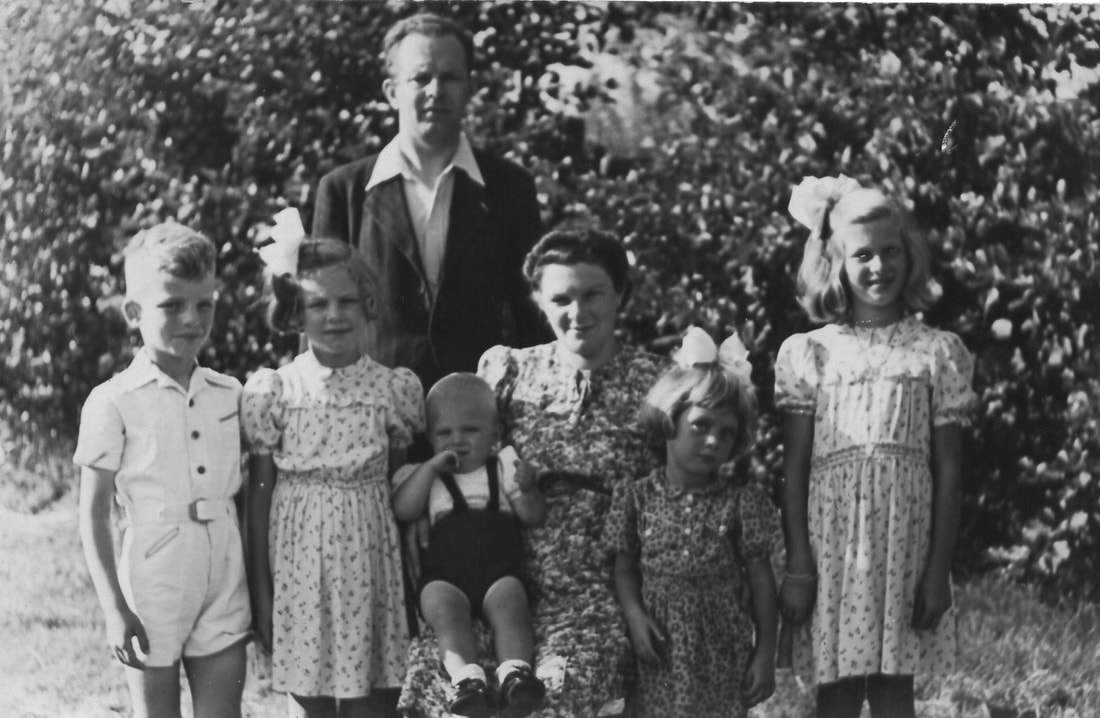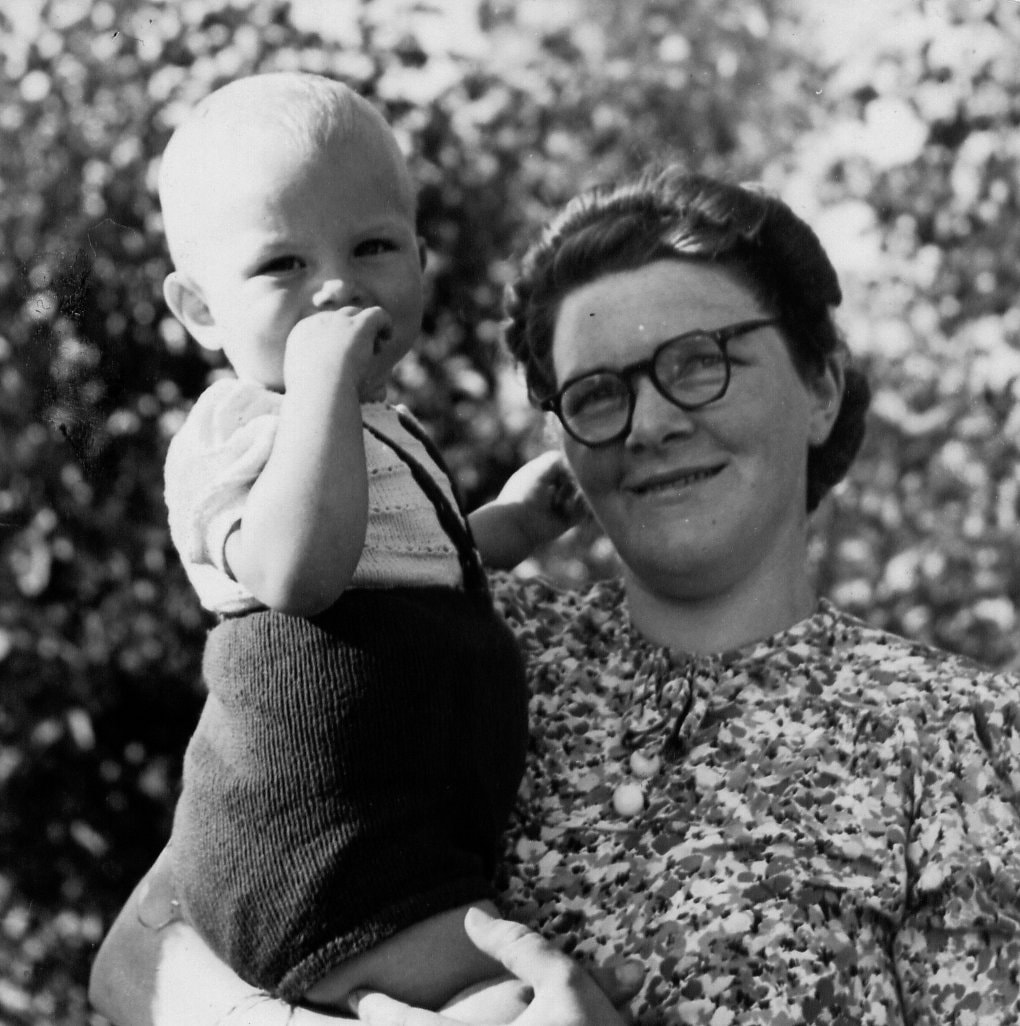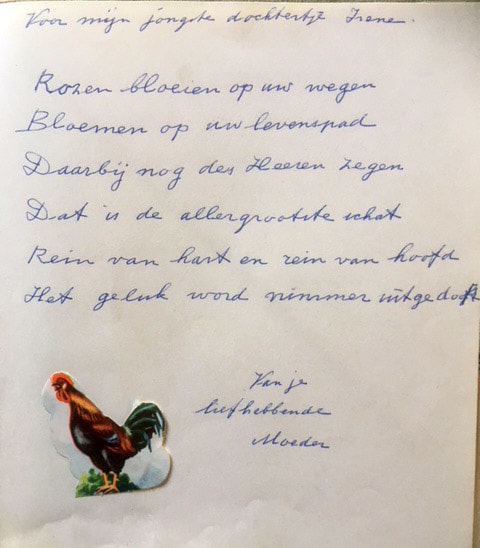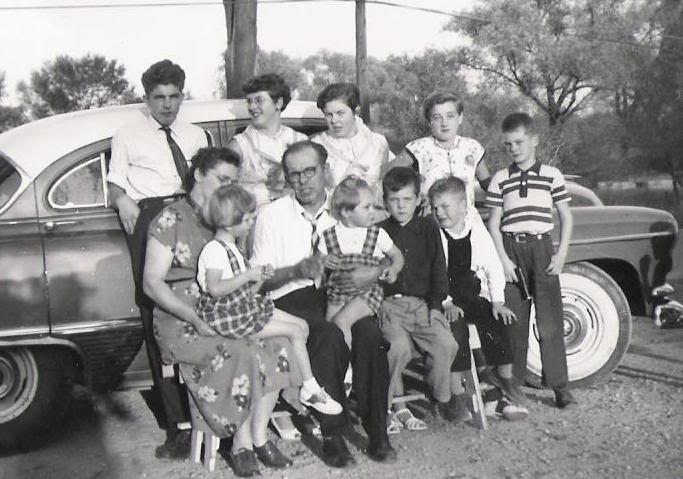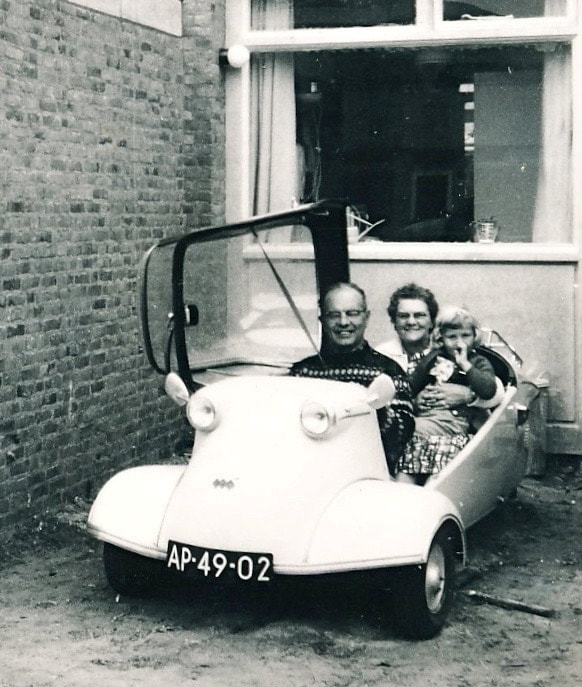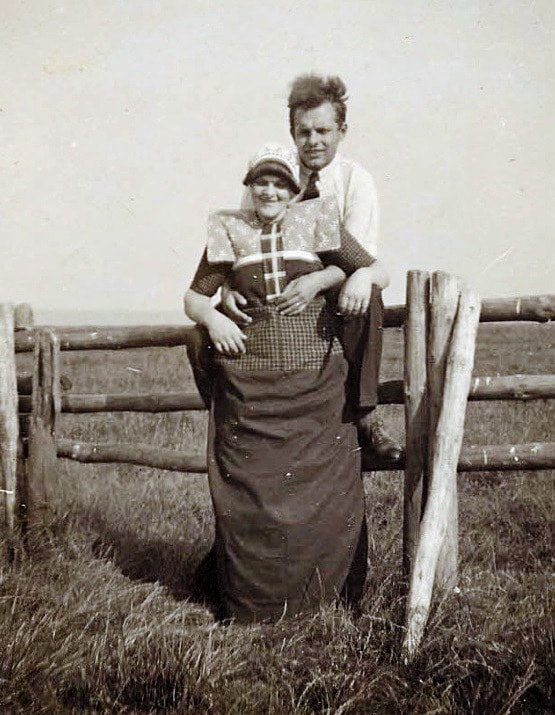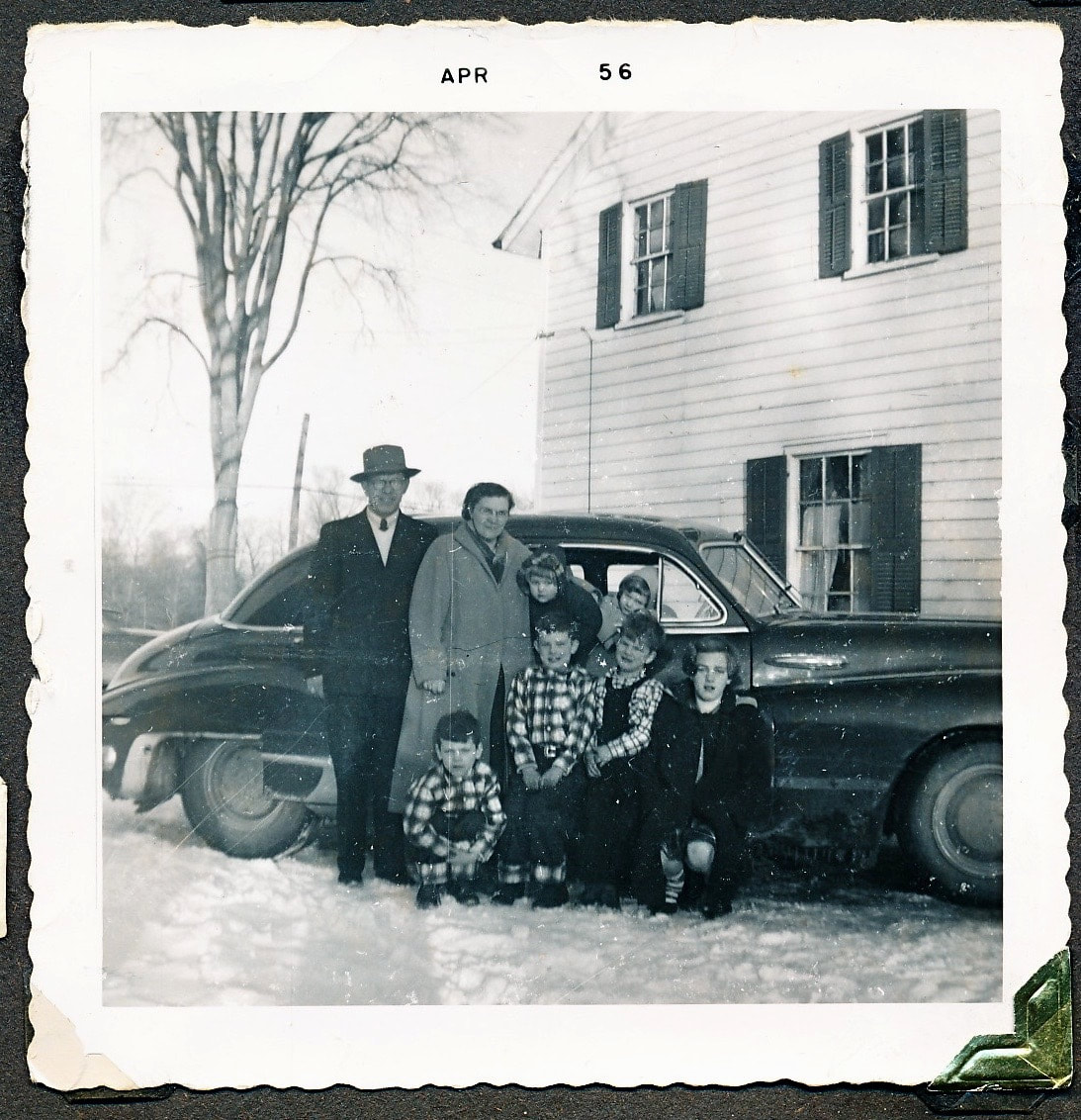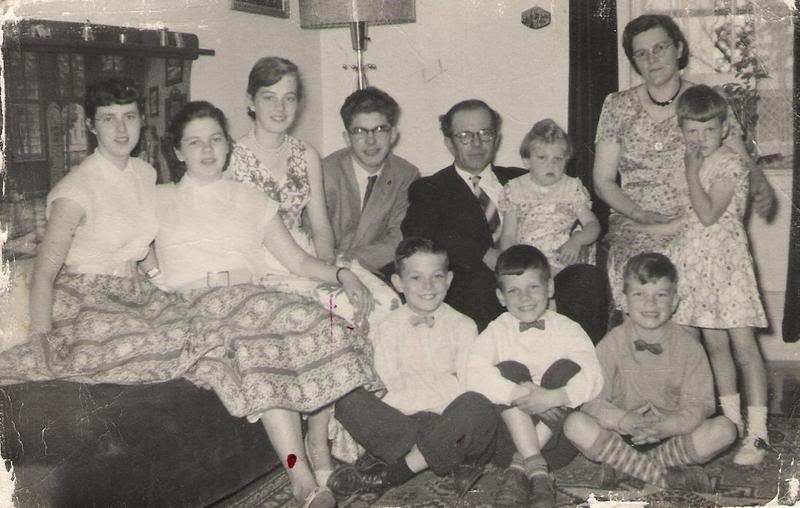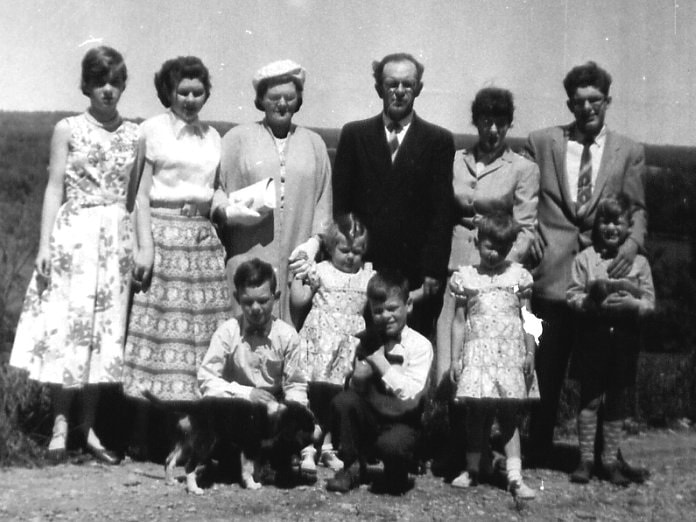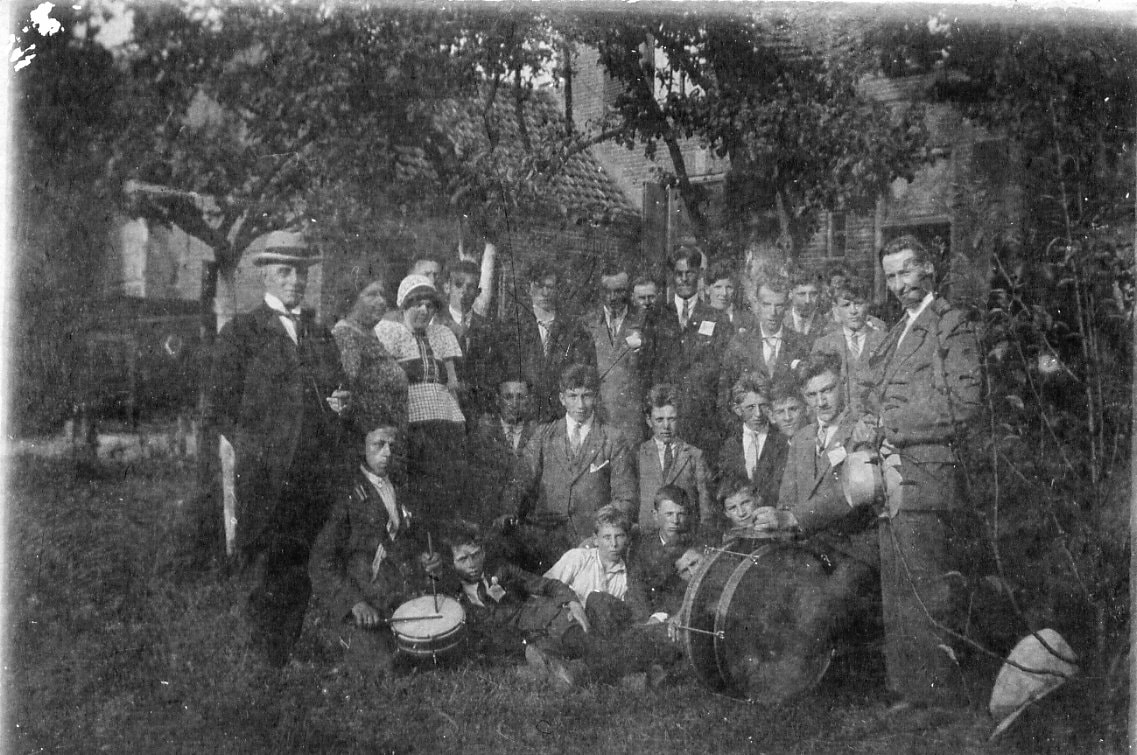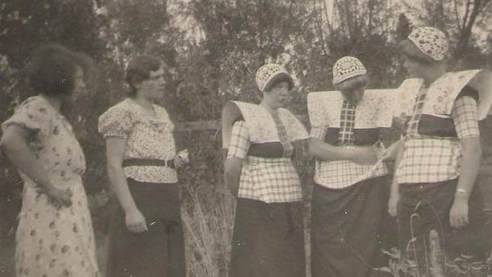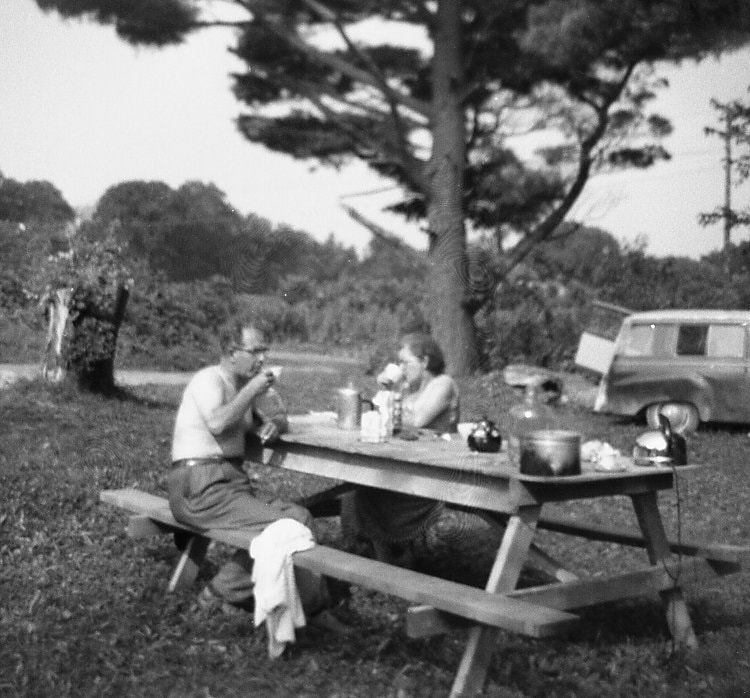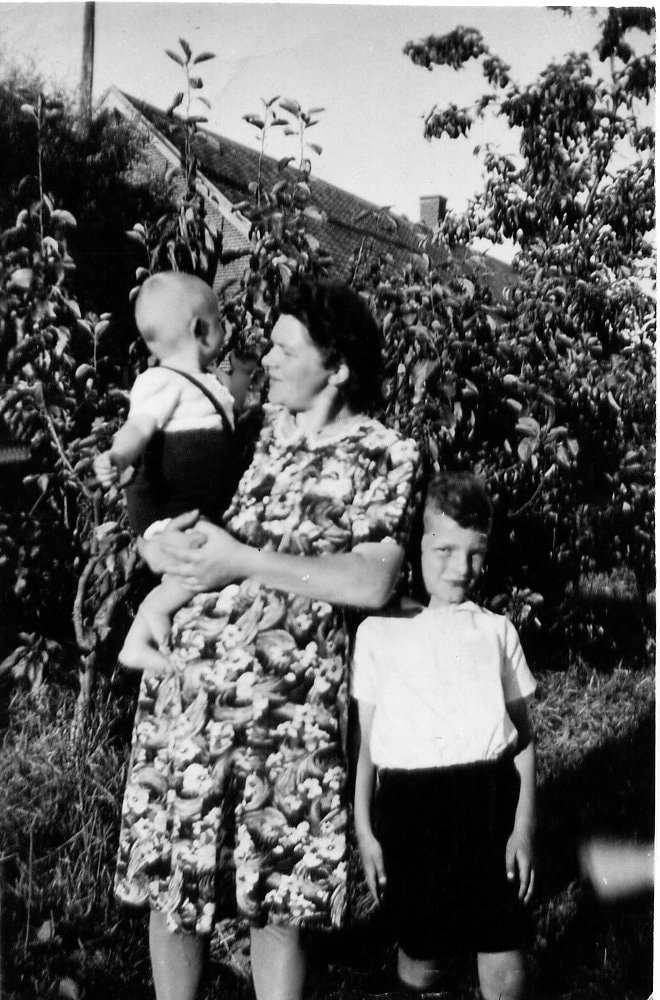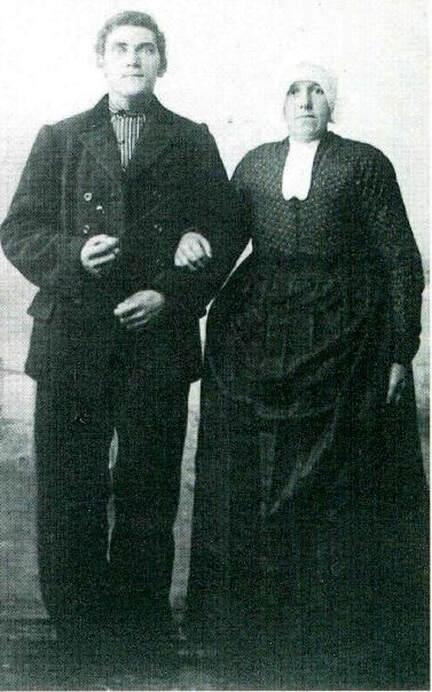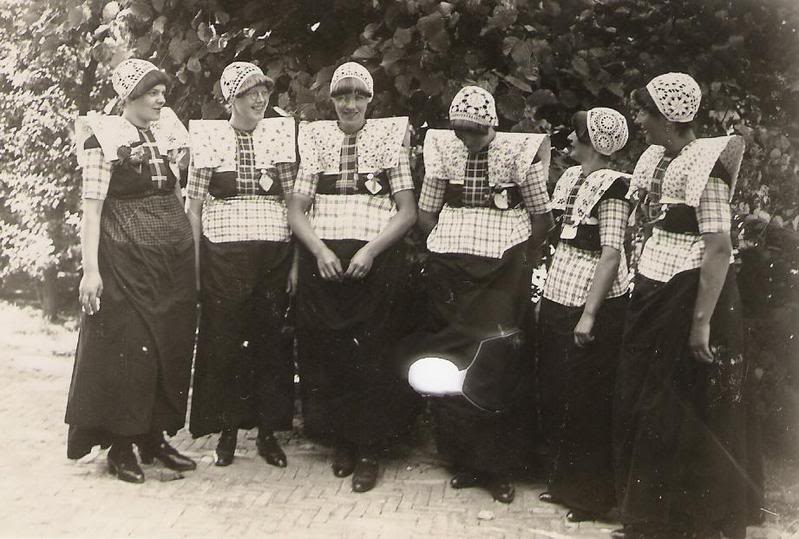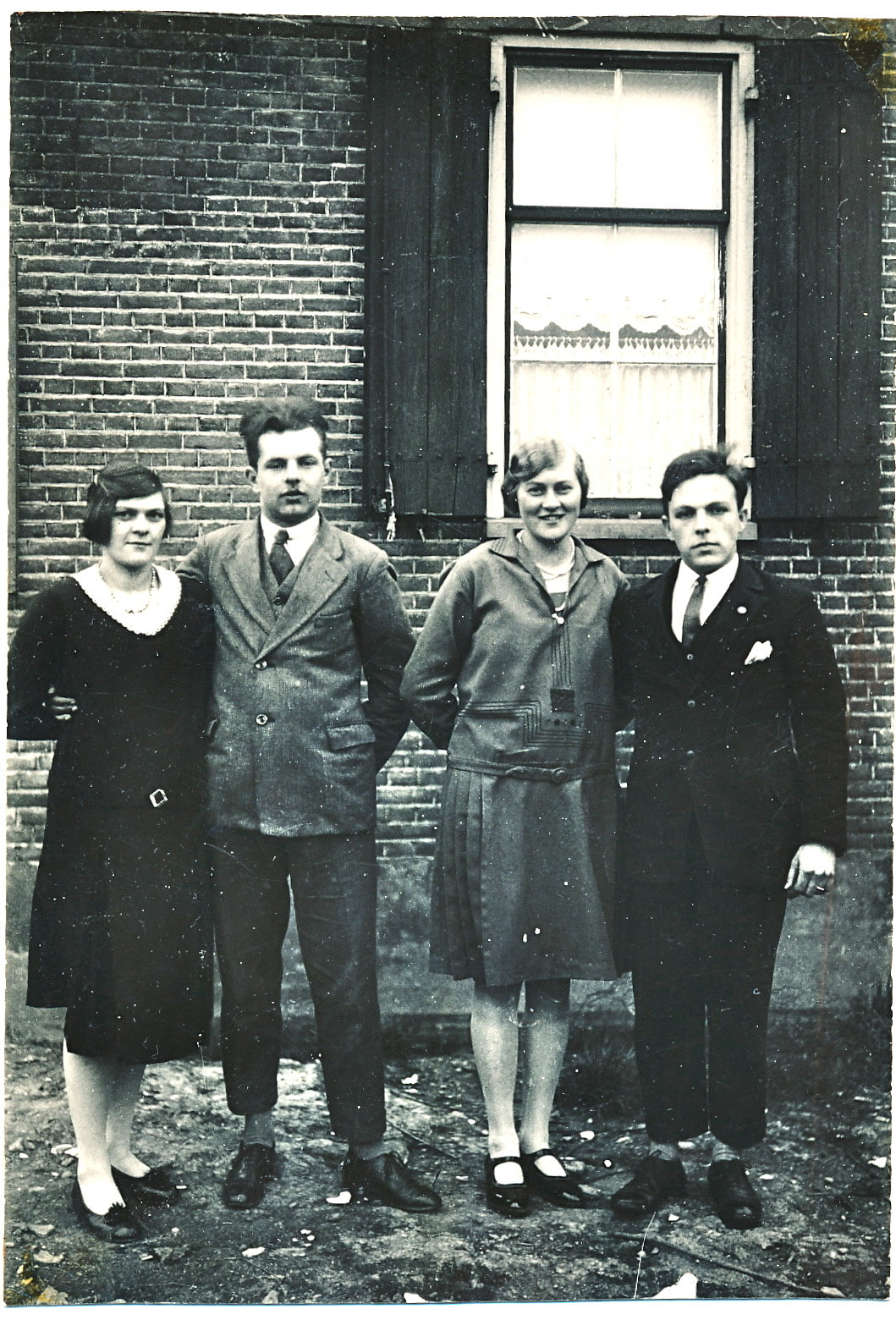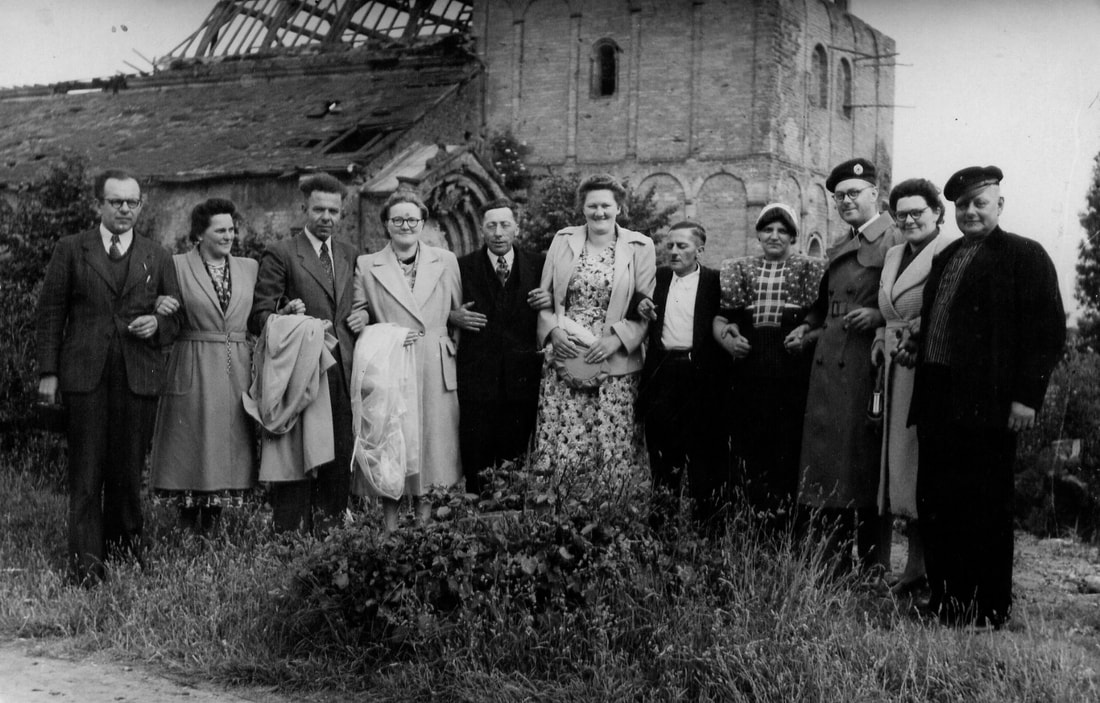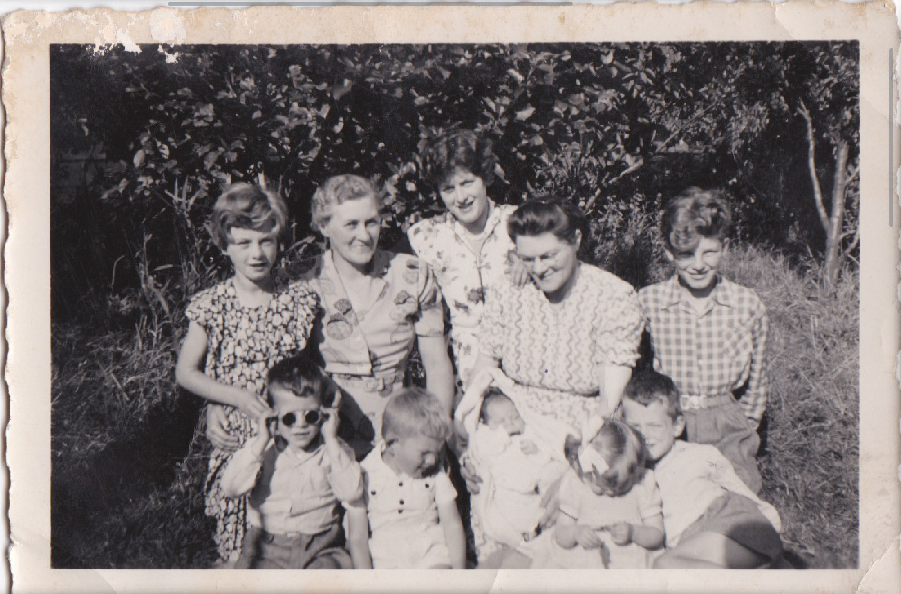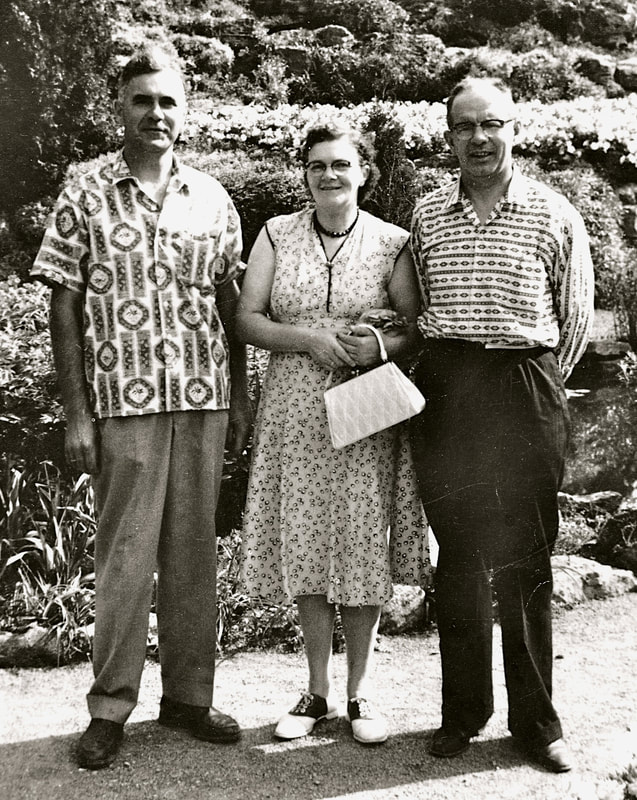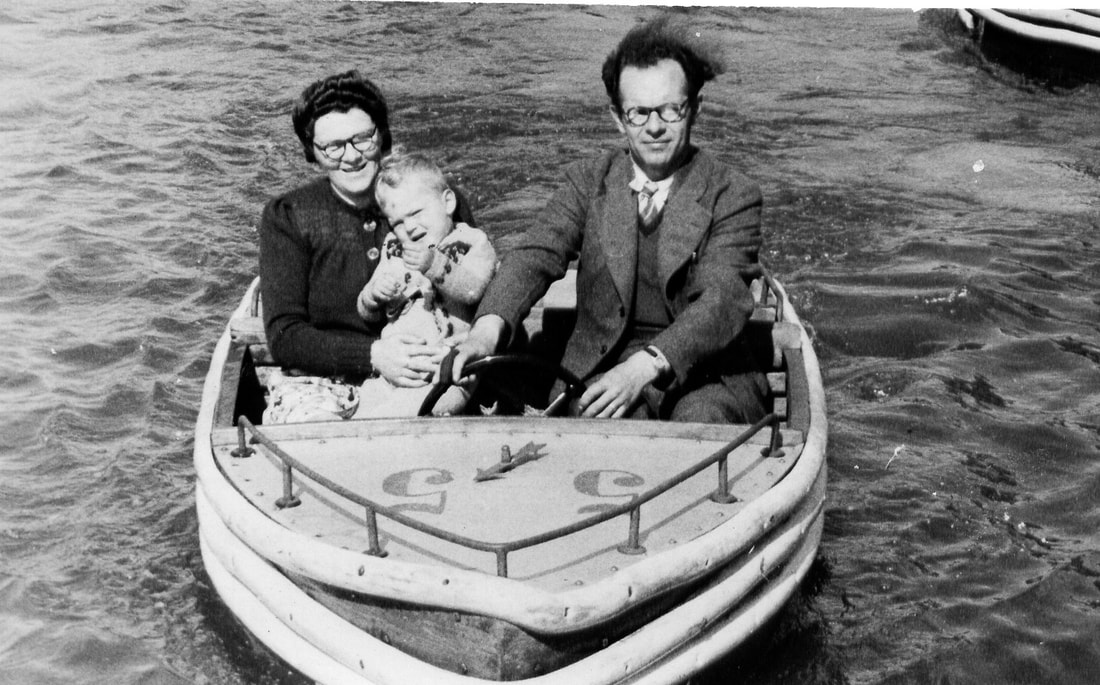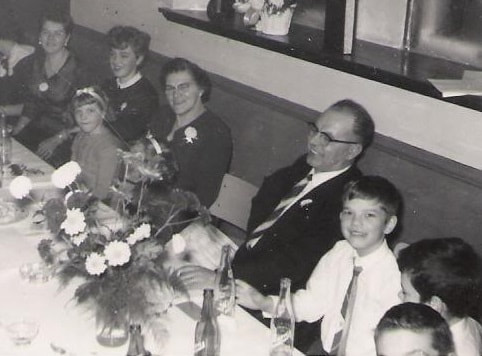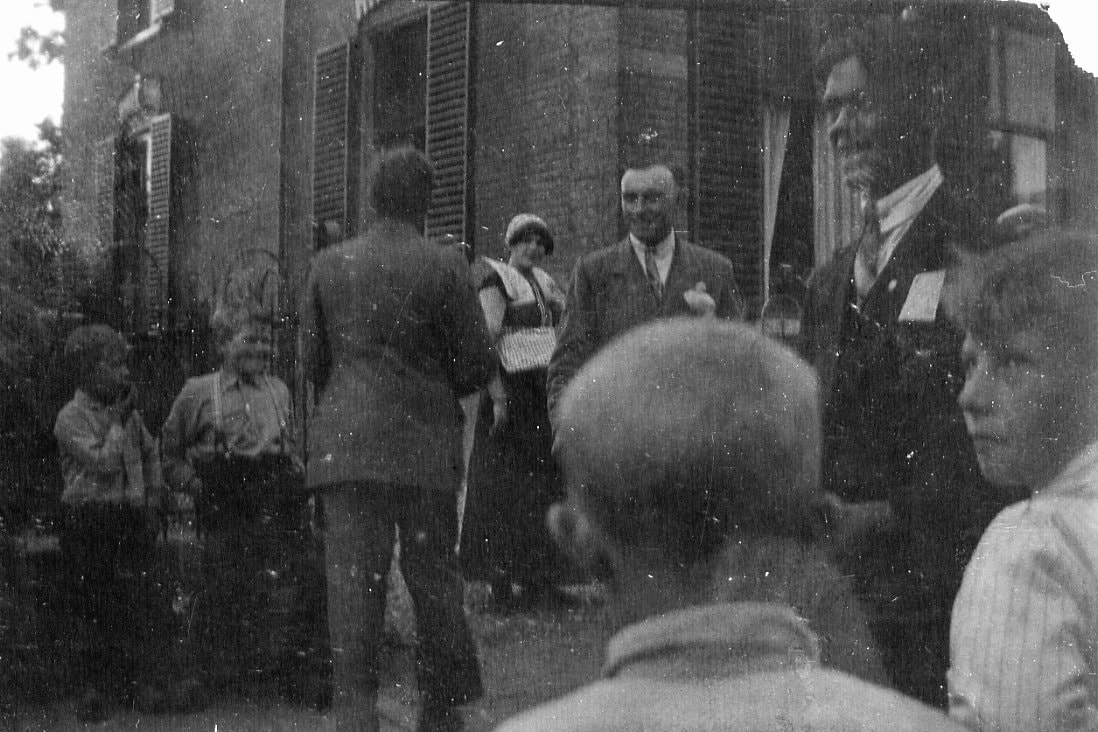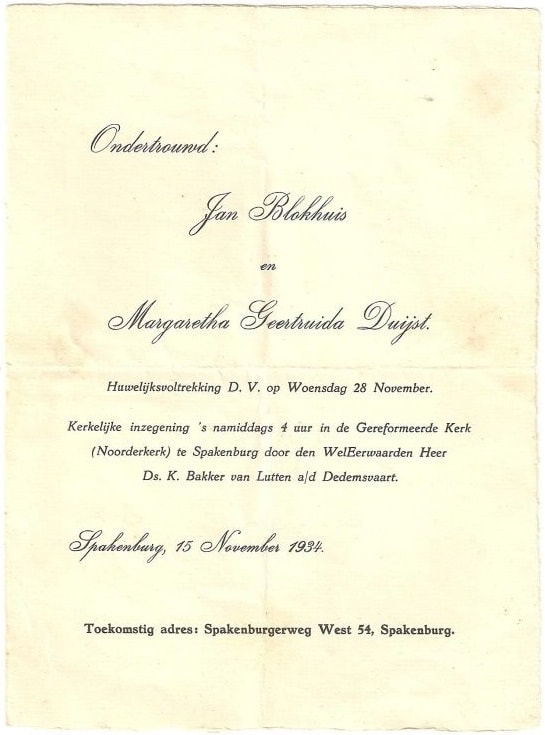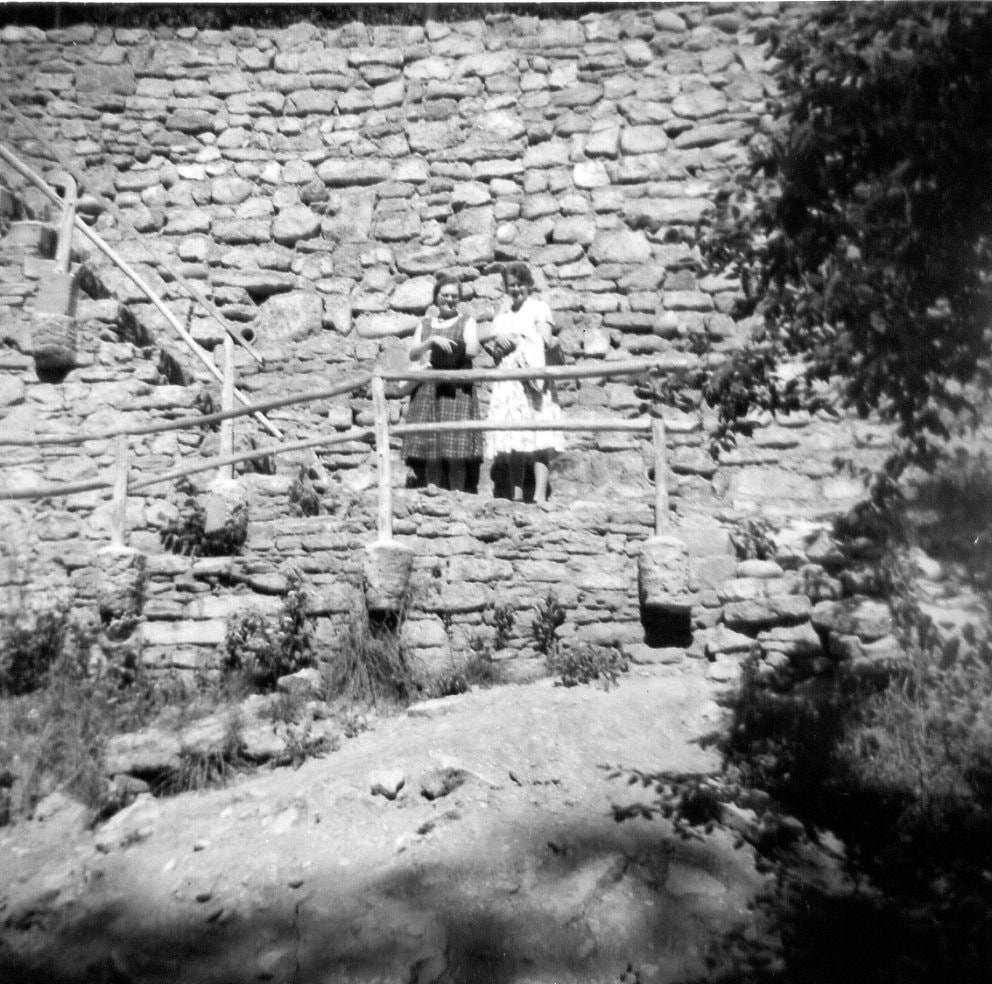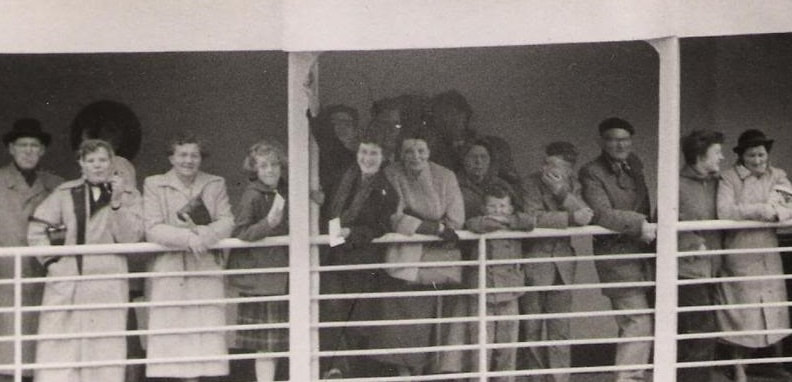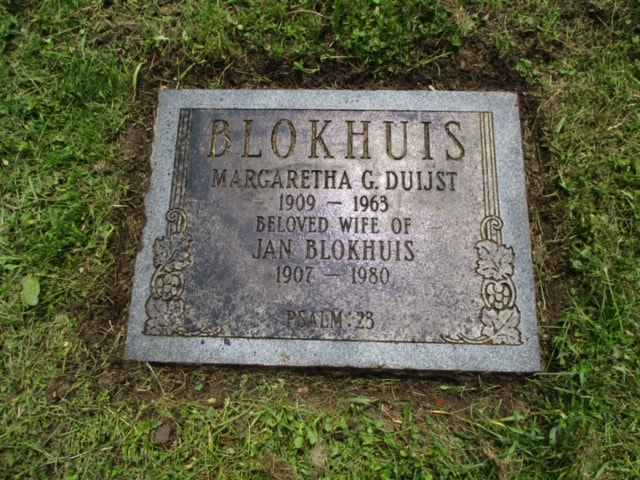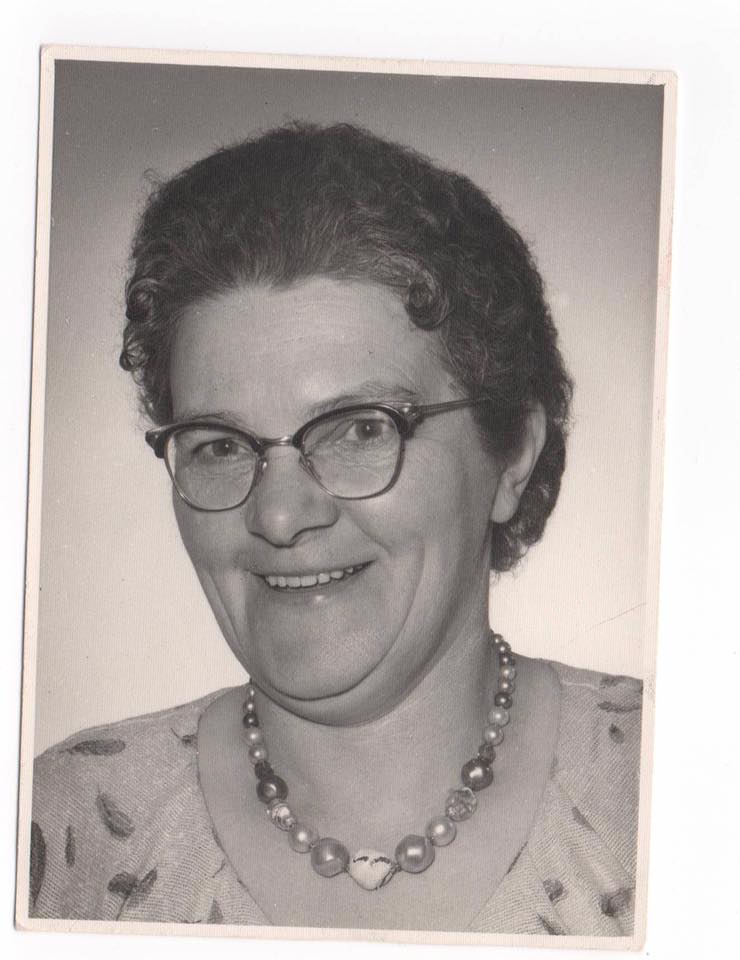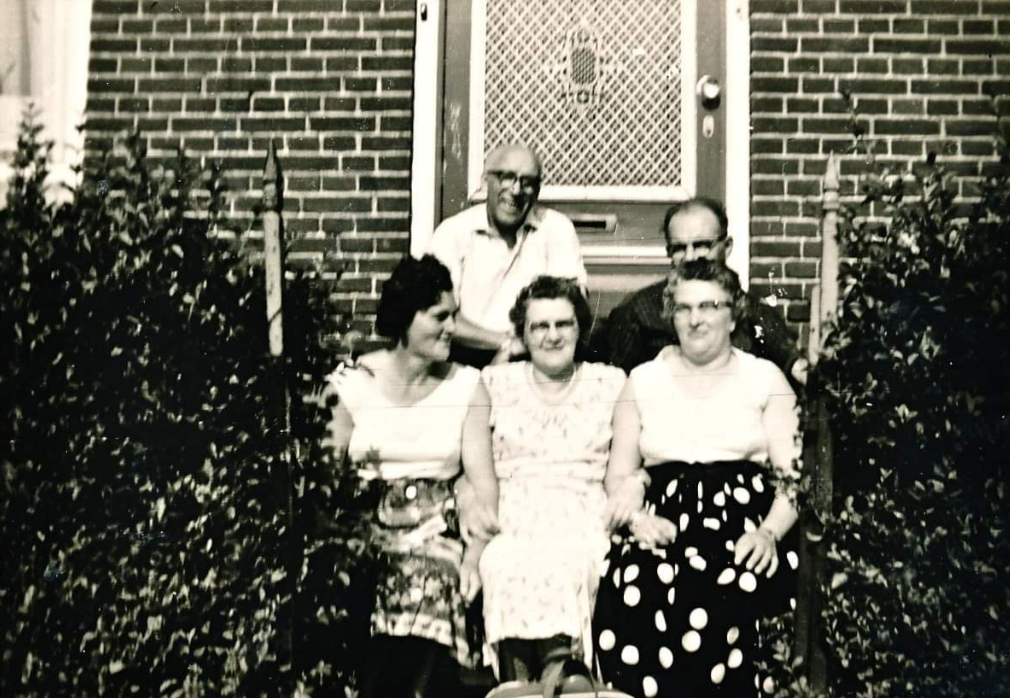Margaretha Geertruida Duijst Blokhuis
Jantje
It is hard to visualize the kind of life that my mother - your grandmother - had. No opportunities existed for women in her religious circle. If you wanted to be a nurse or teacher then you could not marry and have a family. Her life has to be looked at with these restrictions in mind.
Margaretha Geertruida Duijst, born in 1909, was the fourth of seven children. Unfortunately her father (a fisherman) passed away when she was two months away from her 12th birthday. This event changed life for her family.
Her oldest sibling Wouterus (17 at the time) was handicapped. Next came Wijmpje (15) who had been left handicapped after having contracted meningitis at age 7. Reintje (14) and Mom (12) were both sent out to live as maids with wealthier families. It was not unusual for children to work in those days (1921). Nothing was in place for a widow with seven children. Come to think of it nothing much is in place today either.
Mom grew up in town and met Jan Blokhuis at age 19 while working at the residence of Maria Blokhuis. They fell in love at first sight and after a long six year relationship, they married.
Mom laughed a lot. She sang and hummed all the time although she could not hold a tune, and she always had some encouraging words for everyone. As children, we were allowed to take apart our kitchen and use all the chairs to make trains and play. We were allowed to make believe and build dollhouses and forts using boxes from our store and Mom often joined us in play.
Growing up, we had a housekeeper who came several times a week, giving Mom a break.
Mom had a great sense of humour and she wrote and adapted a number of plays which were used at congregational meetings and festivities in Canada. She was always eager to participate in the regular ladies meetings and took her turn writing essays for bible study nights.
The move to Canada was hard on Mom. She had grown up in Spakenburg with her peers and sisters: Wijmpje, Reintje, Geertje, Hendrikje, and Hendrika, and many days were spent with the sisters darning socks outside with a lot of laughter while they compared the antics of their offspring. Two of her sisters (Reintje and Geertje) moved out of town but three remained in town.
After leaving for Canada, Mom was often lonely, especially when we lived in the country. We moved often in the first years in Canada: 1955 Weston, 1956 Thornhill, 1957 Glenwilliams, 1958 Inglewood, 1960 Bramalea (it was country then) and finally - in 1961- in Brampton, we settled in our own house.
Mom could sew anything without a pattern. She once made bathing suits for her and her two youngest - Irene and Wilma - out of old draperies so that they could go swimming in the Credit River in Inglewood. She could knit and embroider anything. If life with nine children had not kept her so busy, she would have used her creativity a lot more.
On questioning her as to why we had moved so far away from her roots, she responded by telling me that she felt it would be a better place for her husband and sons. The fear of seeing her sons in the army was great. After the war ended in 1945, all young men in the Netherlands had to serve a time in the army and Aart was 15 when we came to Canada.
Her life revolved totally around her children and the church. Social life within the church community was strictly within the immigrant group. Mom was more liberal than most. She tolerated differences more than most others within the group. This is one of the things that I loved about her. She often said in our conversations that we should not judge others as if we were the creator. She had accepted that one of her sisters as well as her own oldest daughter had left her church for another, which - believe me - was big. Most who left were shunned by their own families.
Mom had a very inventive, creative mind and she came up with several ideas on new products, one of which was knitting a sock-type sleeve for men so that their parts would not be cold in the winter! We had a lot of fun with that one. Mom was also very psychic. She knew when the phone would ring and who it was, long before it rang. And she always knew when any of us kids were up to something.
She had beautiful penmanship and no-one surpassed her in math.
In her last years, she was not well. She had growths under her right arm that had been removed and was told by doctors that if they recurred, there was a great chance that her glands would be involved. She also suffered greatly from migraine headaches in her last years. At the time of her death at 54, she had been going to the hospital for therapy to help her raise her arm and unfortunately the growths had come back.
Hers is the story of a woman of her time, dedicated to family and a spiritual life.
It is hard to visualize the kind of life that my mother - your grandmother - had. No opportunities existed for women in her religious circle. If you wanted to be a nurse or teacher then you could not marry and have a family. Her life has to be looked at with these restrictions in mind.
Margaretha Geertruida Duijst, born in 1909, was the fourth of seven children. Unfortunately her father (a fisherman) passed away when she was two months away from her 12th birthday. This event changed life for her family.
Her oldest sibling Wouterus (17 at the time) was handicapped. Next came Wijmpje (15) who had been left handicapped after having contracted meningitis at age 7. Reintje (14) and Mom (12) were both sent out to live as maids with wealthier families. It was not unusual for children to work in those days (1921). Nothing was in place for a widow with seven children. Come to think of it nothing much is in place today either.
Mom grew up in town and met Jan Blokhuis at age 19 while working at the residence of Maria Blokhuis. They fell in love at first sight and after a long six year relationship, they married.
Mom laughed a lot. She sang and hummed all the time although she could not hold a tune, and she always had some encouraging words for everyone. As children, we were allowed to take apart our kitchen and use all the chairs to make trains and play. We were allowed to make believe and build dollhouses and forts using boxes from our store and Mom often joined us in play.
Growing up, we had a housekeeper who came several times a week, giving Mom a break.
Mom had a great sense of humour and she wrote and adapted a number of plays which were used at congregational meetings and festivities in Canada. She was always eager to participate in the regular ladies meetings and took her turn writing essays for bible study nights.
The move to Canada was hard on Mom. She had grown up in Spakenburg with her peers and sisters: Wijmpje, Reintje, Geertje, Hendrikje, and Hendrika, and many days were spent with the sisters darning socks outside with a lot of laughter while they compared the antics of their offspring. Two of her sisters (Reintje and Geertje) moved out of town but three remained in town.
After leaving for Canada, Mom was often lonely, especially when we lived in the country. We moved often in the first years in Canada: 1955 Weston, 1956 Thornhill, 1957 Glenwilliams, 1958 Inglewood, 1960 Bramalea (it was country then) and finally - in 1961- in Brampton, we settled in our own house.
Mom could sew anything without a pattern. She once made bathing suits for her and her two youngest - Irene and Wilma - out of old draperies so that they could go swimming in the Credit River in Inglewood. She could knit and embroider anything. If life with nine children had not kept her so busy, she would have used her creativity a lot more.
On questioning her as to why we had moved so far away from her roots, she responded by telling me that she felt it would be a better place for her husband and sons. The fear of seeing her sons in the army was great. After the war ended in 1945, all young men in the Netherlands had to serve a time in the army and Aart was 15 when we came to Canada.
Her life revolved totally around her children and the church. Social life within the church community was strictly within the immigrant group. Mom was more liberal than most. She tolerated differences more than most others within the group. This is one of the things that I loved about her. She often said in our conversations that we should not judge others as if we were the creator. She had accepted that one of her sisters as well as her own oldest daughter had left her church for another, which - believe me - was big. Most who left were shunned by their own families.
Mom had a very inventive, creative mind and she came up with several ideas on new products, one of which was knitting a sock-type sleeve for men so that their parts would not be cold in the winter! We had a lot of fun with that one. Mom was also very psychic. She knew when the phone would ring and who it was, long before it rang. And she always knew when any of us kids were up to something.
She had beautiful penmanship and no-one surpassed her in math.
In her last years, she was not well. She had growths under her right arm that had been removed and was told by doctors that if they recurred, there was a great chance that her glands would be involved. She also suffered greatly from migraine headaches in her last years. At the time of her death at 54, she had been going to the hospital for therapy to help her raise her arm and unfortunately the growths had come back.
Hers is the story of a woman of her time, dedicated to family and a spiritual life.
Irene
Everyone has their own memories and perceptions of her. I was 10 when she was killed so I don’t have the in depth memories that my older siblings have. But I do have fragments and glimpses of things about her so here goes.
What I think would be important for your generation to know is how much courage she had. Moving to a strange country, giving up all that she had, learning new ways; that took courage. And she was loyal. And she was accepting.
This may not make sense to you, it didn’t for me for many years. I remember she was sewing buttons on something. I wanted to try so she gave me a needle and thread. I threaded the needle and had a lovely long thread that I spit knotted. She told me that this was wasteful. A long thread was a sign of laziness she told me, lazy habits never turn out well. Using a shorter length thread prevented knotting and breaks. She was right. Very transferable lesson.
I was annoyed if you could call it that by her insistence that Wilma and I dressed alike. No biggy.
I annoyed her daily, I just did. Ask any of the older siblings.
She missed her sisters and her mother terribly, and Trix who moved back to Holland. She missed the ease of walking through the village and knowing everyone.
I think she liked adventure, she easily made friends in Canada and adapted to the different ways. Mind you she was very much a part of her church and found great comfort in this. Her faith was simple and pure.
I have no idea what I might do that she did. I have over the years heard various siblings tell me I reminded them of her or something about my house or garden reminded them, this includes [Jan].
She loved her psalms and hymns and Handels Messiah. We didn’t have tv, not sure about a radio. She would not have understood English anyway. But she knew the words to many of the old songs and I do remember her singing a lot.
When she had a headache, she would need to lie down and she would have handkerchief drenched in eu de cologne.
She laughed a lot with my dad. She always looked nice and tidy. My dad said she was deftig which means classy or royal or something. I don’t know if she was a good cook.
She had breast lumps removed but no malignancy.
One time I came home from school and all my dolls were lined up in the living room window. She had made new dresses for all of them. How nice was that?
She used to make popsicles by pouring freshie into ice cube trays and sticking little sticks or spoons in them.
She kept a bottle of cognac in the cupboard and would once in a while take a swig. Shhhh lol.
She wrote beautifully and I have a poem she wrote for me. When I find it I will send it to you.
When Henriette Hopman was born she made biscuitjes with coloured hagelslag to celebrate.
She was always happy to get a letter from Beep(Trixie).
One of her best friends was Lucy, a lady outside the church.
She canned fruit and vegetables.
She didn’t ever take a shower, only a bath.
She did make yummy caved in cakes. We’ve all deliberately tried to cave in cakes.
She curled her hair by twisting it and then putting on two hairpins criss-crossed. She did not wear make up. She had some varicose vines and wore support stockings that were held up by garters attached to a corset.
She knew very little English and never became a Canadian citizen.
Everyone has their own memories and perceptions of her. I was 10 when she was killed so I don’t have the in depth memories that my older siblings have. But I do have fragments and glimpses of things about her so here goes.
What I think would be important for your generation to know is how much courage she had. Moving to a strange country, giving up all that she had, learning new ways; that took courage. And she was loyal. And she was accepting.
This may not make sense to you, it didn’t for me for many years. I remember she was sewing buttons on something. I wanted to try so she gave me a needle and thread. I threaded the needle and had a lovely long thread that I spit knotted. She told me that this was wasteful. A long thread was a sign of laziness she told me, lazy habits never turn out well. Using a shorter length thread prevented knotting and breaks. She was right. Very transferable lesson.
I was annoyed if you could call it that by her insistence that Wilma and I dressed alike. No biggy.
I annoyed her daily, I just did. Ask any of the older siblings.
She missed her sisters and her mother terribly, and Trix who moved back to Holland. She missed the ease of walking through the village and knowing everyone.
I think she liked adventure, she easily made friends in Canada and adapted to the different ways. Mind you she was very much a part of her church and found great comfort in this. Her faith was simple and pure.
I have no idea what I might do that she did. I have over the years heard various siblings tell me I reminded them of her or something about my house or garden reminded them, this includes [Jan].
She loved her psalms and hymns and Handels Messiah. We didn’t have tv, not sure about a radio. She would not have understood English anyway. But she knew the words to many of the old songs and I do remember her singing a lot.
When she had a headache, she would need to lie down and she would have handkerchief drenched in eu de cologne.
She laughed a lot with my dad. She always looked nice and tidy. My dad said she was deftig which means classy or royal or something. I don’t know if she was a good cook.
She had breast lumps removed but no malignancy.
One time I came home from school and all my dolls were lined up in the living room window. She had made new dresses for all of them. How nice was that?
She used to make popsicles by pouring freshie into ice cube trays and sticking little sticks or spoons in them.
She kept a bottle of cognac in the cupboard and would once in a while take a swig. Shhhh lol.
She wrote beautifully and I have a poem she wrote for me. When I find it I will send it to you.
When Henriette Hopman was born she made biscuitjes with coloured hagelslag to celebrate.
She was always happy to get a letter from Beep(Trixie).
One of her best friends was Lucy, a lady outside the church.
She canned fruit and vegetables.
She didn’t ever take a shower, only a bath.
She did make yummy caved in cakes. We’ve all deliberately tried to cave in cakes.
She curled her hair by twisting it and then putting on two hairpins criss-crossed. She did not wear make up. She had some varicose vines and wore support stockings that were held up by garters attached to a corset.
She knew very little English and never became a Canadian citizen.
|
Voor mijn jongste dochtertje Irene
Rozen bloeien op uw wegen Bloemen op uw levenspad Daarbij nog den (?Heeren fegen) Dat in de allergrootste (?ichat) Rein van hart en rein van hoofd Het geluk word nimmer uitgedooft Van je liefhebbende Moeder Translation:
For my youngest daughter Irene Roses bloom on your roads Blooming on your life path Reminders of Gods blessing That is all the greatest love Pure of heart and pure of head Happiness is never diminished From your loving Mother |
Wilma
One of my earliest and my most cherished memories of my mother, Margaretha Geertruida Duijst Blokhuis, was how happy she was to have found a pink impatiens growing beside the barn when we lived on Caledon Hill near Orangeville, ON. I think I was four years old.
She dug it up that plant, put it into a clay flower pot and placed it in the window.
Mom loved flowers, especially ox-eye daisies which grow wild everywhere. She would pick some blooms and put them in a vase on the table.
She enjoyed nature; she swam with us in the Credit River which flowed near our house in Glen Williams and later when we moved to Caledon Hill. She loved going to Forks of the Credit Provincial Park see the lilac dell and nearby Belfountain Provincial Park – both parks are along the Credit River near Caledon. I’ve been to both parks as an adult, on hiking trips, and can fully understand why she loved these beautiful places.
Mom sewed doll clothes for me and let me use the iron to smooth out the wrinkles.
After moving to a farmhouse in present-day Bramalea, she challenged my Grade 2 teacher; she had marked some my correct arithmetic answers on a test wrong although Mom found they were correct. Using her best broken English, she spoke to the teacher. The teacher made the corrections.
After moving to into a subdivision house in Brampton, where we lived for eight years, Mom wanted desperately to to learn enough English to invite the neighbour ladies to our house for tea. We played with the neighbourhood kids and Mom wanted to get to know their mothers.
Mom missed her friends in her native country, The Netherlands; she missed the ability to communicate with everybody she met in her native language – Dutch. We came to Canada in 1955.
She always asked us to answer her in English and to repeat our answer until she understood. "I have to learn English," she would tell us in Dutch.
Mom laughed a lot; she was always very cheerful and talkative with her Dutch friends. She and her friends filled the house with laughter.
She used to make me laugh. One of the funniest incidents for me was when her and I were fighting over my favourite bedsheet – she wanted to wash it and I wouldn’t let her take it off the bed. This resulted in a tug-of-war with her and I laughing ourselves silly. She won – that sheet got washed.
Shortly after we moved to Brampton she felt I was old enough to start doing the dishes – she challenged me not to break anything, especially her good cups and saucers. I managed, the very first time I did dishes, not to break anything. To this day I’m very careful with the dishes.
Mom made a tray of hard fudge but something went wrong - it didn't harden. Knowing how much I love chocolate, she let me eat the whole thing.
She also taught me a little bit of sewing and knitting – two things I don't enjoy but can appreciate, and how to hang the laundry on the clothesline – something I love to do.
Hanging laundry out to dry on the clothesline and automatically answering in English when somebody speaks to me in Dutch are two things that I do to this day that remind me of her.
Mom was a wonderful woman, a fabulous mother, a great cook and baker. She fed us well on a very tight budget.
She was an amazing woman who gave birth to, raised, and loved her nine children.
We lost her shortly after my 12th birthday in October 1963; a very, very sad day for our family.
One of my earliest and my most cherished memories of my mother, Margaretha Geertruida Duijst Blokhuis, was how happy she was to have found a pink impatiens growing beside the barn when we lived on Caledon Hill near Orangeville, ON. I think I was four years old.
She dug it up that plant, put it into a clay flower pot and placed it in the window.
Mom loved flowers, especially ox-eye daisies which grow wild everywhere. She would pick some blooms and put them in a vase on the table.
She enjoyed nature; she swam with us in the Credit River which flowed near our house in Glen Williams and later when we moved to Caledon Hill. She loved going to Forks of the Credit Provincial Park see the lilac dell and nearby Belfountain Provincial Park – both parks are along the Credit River near Caledon. I’ve been to both parks as an adult, on hiking trips, and can fully understand why she loved these beautiful places.
Mom sewed doll clothes for me and let me use the iron to smooth out the wrinkles.
After moving to a farmhouse in present-day Bramalea, she challenged my Grade 2 teacher; she had marked some my correct arithmetic answers on a test wrong although Mom found they were correct. Using her best broken English, she spoke to the teacher. The teacher made the corrections.
After moving to into a subdivision house in Brampton, where we lived for eight years, Mom wanted desperately to to learn enough English to invite the neighbour ladies to our house for tea. We played with the neighbourhood kids and Mom wanted to get to know their mothers.
Mom missed her friends in her native country, The Netherlands; she missed the ability to communicate with everybody she met in her native language – Dutch. We came to Canada in 1955.
She always asked us to answer her in English and to repeat our answer until she understood. "I have to learn English," she would tell us in Dutch.
Mom laughed a lot; she was always very cheerful and talkative with her Dutch friends. She and her friends filled the house with laughter.
She used to make me laugh. One of the funniest incidents for me was when her and I were fighting over my favourite bedsheet – she wanted to wash it and I wouldn’t let her take it off the bed. This resulted in a tug-of-war with her and I laughing ourselves silly. She won – that sheet got washed.
Shortly after we moved to Brampton she felt I was old enough to start doing the dishes – she challenged me not to break anything, especially her good cups and saucers. I managed, the very first time I did dishes, not to break anything. To this day I’m very careful with the dishes.
Mom made a tray of hard fudge but something went wrong - it didn't harden. Knowing how much I love chocolate, she let me eat the whole thing.
She also taught me a little bit of sewing and knitting – two things I don't enjoy but can appreciate, and how to hang the laundry on the clothesline – something I love to do.
Hanging laundry out to dry on the clothesline and automatically answering in English when somebody speaks to me in Dutch are two things that I do to this day that remind me of her.
Mom was a wonderful woman, a fabulous mother, a great cook and baker. She fed us well on a very tight budget.
She was an amazing woman who gave birth to, raised, and loved her nine children.
We lost her shortly after my 12th birthday in October 1963; a very, very sad day for our family.
Art
He along with his siblings enjoyed the caved in pound cake. They must have taken turns opening the oven door before it was fully baked.
His Mom had a great sense of humour. One time he asked for a bigger piece of cake for his lunch. The next day he opened his lunch box and found his lunch was cake, cut up to fit perfectly. She figured that would cure him, but instead when he came home that night, he asked if she could do that again. She replied with lelijke jong.
He often came home late, so supper was kept warm for him. One time the family had enjoyed ketelkoel, which was a real treat. (A sort of raisin cake shaped like a bundt cake that was served warm with melted butter and brown sugar.) What he got was bread crust with melted butter and sugar, because they had forgotten that he had not eaten.
He also remembers how protective she was. One time his uncle who lived next to them in Holland, thought he could discipline him by hitting him over the head, well his Mom happened to see it, and really lit into her brother-in-law.
Also he remembers how his Mom really enjoyed going to the weekly ladies society, and how she enjoyed having company.
He along with his siblings enjoyed the caved in pound cake. They must have taken turns opening the oven door before it was fully baked.
His Mom had a great sense of humour. One time he asked for a bigger piece of cake for his lunch. The next day he opened his lunch box and found his lunch was cake, cut up to fit perfectly. She figured that would cure him, but instead when he came home that night, he asked if she could do that again. She replied with lelijke jong.
He often came home late, so supper was kept warm for him. One time the family had enjoyed ketelkoel, which was a real treat. (A sort of raisin cake shaped like a bundt cake that was served warm with melted butter and brown sugar.) What he got was bread crust with melted butter and sugar, because they had forgotten that he had not eaten.
He also remembers how protective she was. One time his uncle who lived next to them in Holland, thought he could discipline him by hitting him over the head, well his Mom happened to see it, and really lit into her brother-in-law.
Also he remembers how his Mom really enjoyed going to the weekly ladies society, and how she enjoyed having company.
Gerda
1. What are your favourite three memories of things she did or said?
Her always singing psalms or hymns. She would sing two lines, check the soup, talk to one of her children then simply pick up where she left off and continue the song. There was always room for one more at our table.
2. What are your favourite things about her personality?
Her easy laughter. Her open house policy, always room for one more. I do not remember her saying that we could not have a friend over.
3. What do you want my generation to know about her?
How closely she walked with God.
4. What is an important lesson she taught you?
To be thankful in all circumstances. To care about others, no matter how often they hurt you.
5. What did she do that annoyed you?
Hit me with her slipper. Lol. Being friends with a couple I did not like. Volunteering me for babysitting for her friends.
6. What did you do that annoyed her, and why did it annoy her?
Not telling her what time I would be home. Not cleaning my room or trying to get out of doing some chore in the house. When I saw a book I had not read, I forgot all about my chores and sat down to read. That annoyed her and yet she always encouraged reading.
7. What is something she missed about Netherlands?
Her family and friends. Mostly her sisters. She would often be homesick, especially in the first years of living in Canada. After Dad and her went for a trip to Holland she seemed to see Canada more as her home.
8. What is something she liked about Canada?
She loved the stores in Canada and the abundance of available articles. How cheap fruit was and she loved drives in the country.
9. What do you do that reminds you of her, or that you feel she would have done?
When I make meatballs for the Dutch soup, I think of her. She loved to teach and always wanted to be a teacher. Held many positions of leadership, mostly in Church circles. She loved writing and speaking for large groups and was often asked to speak. I see that in myself. Loved her children unconditionally and was so proud of them.
10. Did she have a favourite song, expression, joke, or story? What was it?
Her songs were mostly in Dutch, so I do not remember. She laughed easily at others jokes. Always had a twinkle in her eyes when she laughed and talked.
1. What are your favourite three memories of things she did or said?
Her always singing psalms or hymns. She would sing two lines, check the soup, talk to one of her children then simply pick up where she left off and continue the song. There was always room for one more at our table.
2. What are your favourite things about her personality?
Her easy laughter. Her open house policy, always room for one more. I do not remember her saying that we could not have a friend over.
3. What do you want my generation to know about her?
How closely she walked with God.
4. What is an important lesson she taught you?
To be thankful in all circumstances. To care about others, no matter how often they hurt you.
5. What did she do that annoyed you?
Hit me with her slipper. Lol. Being friends with a couple I did not like. Volunteering me for babysitting for her friends.
6. What did you do that annoyed her, and why did it annoy her?
Not telling her what time I would be home. Not cleaning my room or trying to get out of doing some chore in the house. When I saw a book I had not read, I forgot all about my chores and sat down to read. That annoyed her and yet she always encouraged reading.
7. What is something she missed about Netherlands?
Her family and friends. Mostly her sisters. She would often be homesick, especially in the first years of living in Canada. After Dad and her went for a trip to Holland she seemed to see Canada more as her home.
8. What is something she liked about Canada?
She loved the stores in Canada and the abundance of available articles. How cheap fruit was and she loved drives in the country.
9. What do you do that reminds you of her, or that you feel she would have done?
When I make meatballs for the Dutch soup, I think of her. She loved to teach and always wanted to be a teacher. Held many positions of leadership, mostly in Church circles. She loved writing and speaking for large groups and was often asked to speak. I see that in myself. Loved her children unconditionally and was so proud of them.
10. Did she have a favourite song, expression, joke, or story? What was it?
Her songs were mostly in Dutch, so I do not remember. She laughed easily at others jokes. Always had a twinkle in her eyes when she laughed and talked.
Clarence/Klaas
Not so much a memory but a realisation of something about our Mom that was really an eye opener for me as an adult. It was many years after her death while talking to my brother Art about how Mom loved us all that I happened to mentioned that I felt and knew for certain in my heart to her I was her favourite. Art said then that perhaps I might feel that way but he knew for sure that he had been Mom's favourite. To be honest at first I felt some shock and surprise. We both realised how special Mom was as a mother to raise nine children who knew Mom loved us all but each was a special surprise for her. I forget now who else I told this story to and that sibling corrected me and made it clear that she had been Mom's favourite. What a beautiful legacy to be remembered by.
PS: just so everyone understands I really was Mom's favourite!!!! (•‿•)
Not so much a memory but a realisation of something about our Mom that was really an eye opener for me as an adult. It was many years after her death while talking to my brother Art about how Mom loved us all that I happened to mentioned that I felt and knew for certain in my heart to her I was her favourite. Art said then that perhaps I might feel that way but he knew for sure that he had been Mom's favourite. To be honest at first I felt some shock and surprise. We both realised how special Mom was as a mother to raise nine children who knew Mom loved us all but each was a special surprise for her. I forget now who else I told this story to and that sibling corrected me and made it clear that she had been Mom's favourite. What a beautiful legacy to be remembered by.
PS: just so everyone understands I really was Mom's favourite!!!! (•‿•)
|
Questions about Oma
1. What are your favourite three memories of things she did or said? 2. What are your favourite things about her personality? 3. What do you want my generation to know about her? 4. What is an important lesson she taught you? 5. What did she do that annoyed you? 6. What did you do that annoyed her, and why did it annoy her? 7. What is something she missed about Netherlands? 8. What is something she liked about Canada? 9. What do you do that reminds you of her, or that you feel she would have done? 10. Did she have a favourite song, expression, joke, or story? What was it? Click images to enlarge Oma's letters:
|
|

